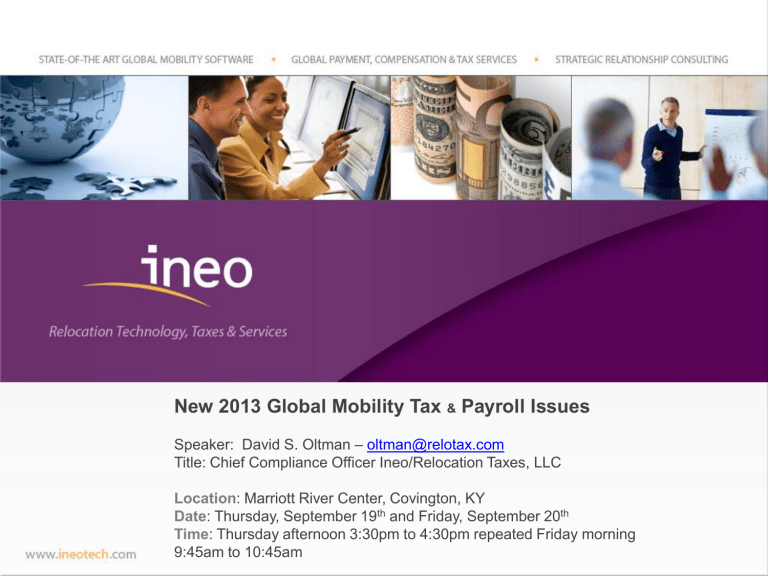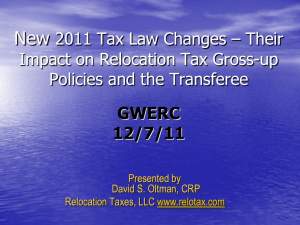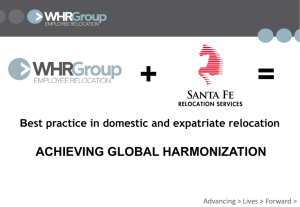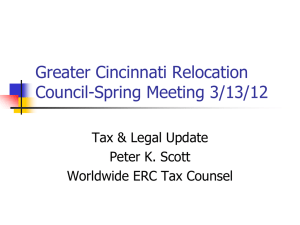2013 Global Mobility Tax and Payroll Issues

New 2013 Global Mobility Tax
&
Payroll Issues
Speaker: David S. Oltman – oltman@relotax.com
Title: Chief Compliance Officer Ineo/Relocation Taxes, LLC
Location : Marriott River Center, Covington, KY
Date : Thursday, September 19 th and Friday, September 20 th
Time : Thursday afternoon 3:30pm to 4:30pm repeated Friday morning
9:45am to 10:45am
Today’s Speakers
David S. Oltman, CRP
Chief Compliance Officer Ineo, Company Co-Founder Relocation Taxes, LLC
David S. Oltman is one of the relocation industry's foremost tax resources. David has brought his expertise and the strength of Relocation Taxes, LLC to the Ineo family of services. David now leads Ineo's Tax division, Relocation Taxes, and serves as the company’s Chief Compliance
Officer.
Prior to joining Ineo, David co-founded Relocation Taxes, LLC and The Hessel Group U.S. and
U.K. in 1987. David began his relocation career as the Manager of Benefits Administration and
Relocation at Ciba Geigy/Novartis Corporation.
He is a member of The International Foundation of Employee Benefits Plans and The Employee
Relocation Council, and co-founder of the Relocation Council of New York City.
David is an ERC Meritorious Service Award winner.
David holds a B.A. in Human Resources and an M.B.A. in Finance.
Agenda – Learning Objectives – At the completion of the session, you should know:
What the new 2013 relocation tax laws are and how they affect your company.
New 2013 gross-up methodologies - how your company can save money.
What grossup and “keep the transferee whole” really mean
– AMT issues
1099C’s and W-2’s and W-2C’s – pros, cons and compliance
How Payroll reporting and taxation of relocation reimbursements are handled
Why temporary assignments are the hottest issue in 2013
H.R. 1129 and S. 3485
– potential New 30 day state tax withholding rules effective in 2014
FICA $113,700 (6.20%) withholding issues/paybacks and the cost of forgiveness
Tax coding/relocation accounting /compliance IRS expense reporting issues
State taxes and how they effect the gross-up calculation – multi-state tax/gross-up issues
Hot 2013 policy trends, 10 things every transferee should know before moving
First Time Home Buyers Tax Credits, $8,000 and $6,500 – gross-up ramifications - Paybacks
2013 Short Sales and the tax impacts of forgiveness
IRS audit targets – relocation red flags
New 2013 Higher Medicare Rates 2.35% (1.45% & 0.90%) and 3.80% and the relocation effects
New IRS Form 8938 – Foreign Financial Assets Form –
Required by many transferees
Form TD F 90-22.1 Reporting of Foreign Bank Financial
Accounts – relocation impacts
New 2013 Corporate Tax & Payroll Issues
Tax Credits lost on tax returns – Education Credits and American
Opportunity Credits – IRS Form 8863 (Phase-out range “Single”
$80,000 $90,000 and “Married Filing Joint” $160,000 to $180,000),
Child Tax Credits ($110,000, $130,000, $150,000…). See RTA p. 11.
Repayment of Home Buyer Tax Credit – IRS Form 5405 if moved again within 3 years. All these issues can effect the transferred employee by several hundred dollars, to several thousand dollars, to well over
$10,000+. See RTA p. 44.
Recommendation: Only after doing a complete gross-up audit in 2013 of the employee’s 2012 tax return. Cost usually between $275 to $425 per audit.*
The importance of proper tax preparation can not be over stated. For example a FL to OH move – and not allocating state wages properly.
*Business Expense . Not taxable.
New 2013 Corporate Tax & Payroll Issues
1) AMT Tax (Alternative Minimum Tax) effects – could effect 10 times more taxpayers, “Target” result is the corporate transferee. (higher gross-ups). See RTA p.10 & page 44
2) All Tax Brackets where indexed for inflation (significant lower gross-ups in 2012 – average was 60% - they will be higher in 2013) See RTA p.11. Brand new – lower phase-outs of itemized deductions (went from 3% to 2% to 1% to 0% in 2010 and 2011 - and lower phase-out for personal exemption amounts 1/3 reduction and a new minimum of $2,333 ($3,700 x.
66.67%) per personal exception. 0% in 2010 and 2011. In 2013 the 2% and 3% phase outs are back . 2013 higher tax rates – gross-up impact - over 85%+ gross-ups for
“executive” moves.
3) How states are catching employees who do not report their wages. Tax Amnesty. Hotel & credit card gas receipts. IRS Employment Tax Audits Begin in 2010 and will run through 2013.
A significant number of audits have been started.
4) New State Sales Tax Deduction – Applies mainly to transferees in nine (9) no income tax states. AK, FL, NV, NH, SD, TN, TX, WA & WY (lower gross-ups) See RTA p.12 Average savings of $600 per move.
5) Reduced Home Sale Exclusion & New Home Buyer Tax Credit ($8,000/$6,500). Very complex. See RTA – p.44 IRS Form 5405 – plus new “Repayment Letter” being sent by IRS based on address changes. If house turned into rental – credit must be repaid.
2013 & 2012 Federal Tax Limits and Thresholds
Value of Exemptions:
Child Tax Credit:
Social Security (OASDI):
Medicare:
Supplemental Rate:
Business Mileage Rate:
Final Move Deductible Rate:
2013
$3,900
$1,000
$113,700 6.20%
2012
$3,800
$1,000
$110,100 4.20%
$200k/$250k/$125k 1.45%
+ if> 2.35%
$999999999 1.45%
25% / 39.6% if over 1 million
$0.565 / mile
$0.24 / mile
25% / 35% if over 1 million
$0.555/mile
$0.23/mile
Standard Deduction: SNG $6,100
MFJ $12,200
HH $8,950
MFS $6,100
Exemption Phase-out:
*For 2013 for each $2,500
($1,250 MFS) that AGI exceeds the threshold, 2% of exemption. value is lost.
SNG
MFJ
$250,000
$300,000
HH $275,000
MFS $150,000
Itemized Ded. Phase-out: SNG $250,000
*For 2013 for each dollar that AGI exceeds MFJ $300,000 threshold,, 3% of itemized. ded. is lost.
HH $275,000
MFS $150,000
Child Tax Credit Phase-out*:
* For every $1,000, or fraction thereof,
SNG
MFJ
$55,000
$110,000 that AGI exceeds the threshold, $50 of the child tax credit is lost.
HH $75,000
MFS $55,000
$5,950
$11,900
$8,700
$5,950
N/A
N/A
N/A
N/A
N/A
N/A
N/A
N/A
$55,000
$110,000
$75,000
$55,000
2013 & 2012 Federal Tax Rates and Gross-up Percentages
Single:
2013 Tax Brackets
$ 0 -
$ 8,925 -
$ 36,250 -
$ 8,925
$ 36,250
$ 87,850
Tax Rate Gross-up % 2012 Tax Brackets Tax Rate Gross-up%
10%
15%
25%
11.11%
17.65%
33.33%
$ 0 -
$ 8,700 -
$ 35,350 -
$ 8,700
$ 35,350
$ 85,650
10%
15%
25%
11.11%
17.65%
33.33%
$ 87,850 -
$ 183,250 –
$ 398,350 –
$ 400,000 -
Marr. Filing Joint: $ 0 -
$ 17,850 -
$ 72,500 -
$ 146,400 -
$ 223,050 -
$ 398,350 -
$ 450,000 -
Head of Household: $ 0 -
$ 12,750 -
$ 48,600 -
$ 183,250 28%
$ 398,350 33%
$ 400,000
+
35%
39.60%
$ 17,850
$ 72,500
10%
15%
$ 146,400 25%
$ 223,050 28%
$ 398,350 33%
$ 450,000 35%
+ 39.60%
$ 12,750 10%
$ 48,600 15%
$ 125,450 25%
38.89%
49.25%
53.85%
65.56%
11.11%
17.65%
33.33%
38.89%
49.25%
53.85%
65.56%
11.11%
17.65%
33.33%
$ 85,650 -
$ 178,650 -
$ 388,350 -
$ 0 -
$ 17,400 -
$ 70,700 -
$ 142,700 -
$ 217,450 -
$ 388,350 -
$ 0 -
$ 12,400 -
$ 47,350 -
$ 178,650 28%
$ 388,350 33%
+ 35%
$ 17,400
$ 70,700
10%
15%
$ 142,700 25%
$ 217,450 28%
$ 388,350 33%
+ 35%
$ 12,400 10%
$ 47,350 15%
$ 122,300 25%
38.89%
49.25%
53.85%
11.11%
17.65%
33.33%
38.89%
49.25%
53.85%
11.11%
17.65%
33.33%
$ 125,450 -
$ 203,150 -
$ 398,350 -
$ 425,000 -
$ 203,150 28%
$ 398,350 33%
$ 425,000
+
35%
39.60%
38.89%
49.25%
53.85%
65.56%
$ 122,300 -
$ 198,050 -
$ 388,350 -
$ 198,050 28%
$ 388,350 33%
+ 35%
38.89%
49.25%
53.85%
Marr. Filing Sep: $ 0 -
$ 8,925 -
$ 8,925
$ 36,250
10%
15%
11.11%
17.65%
$ 0 -
$ 8,700 -
$ 8,700
$ 35,350
10%
15%
11.11%
17.65%
$ 36,250 -
$ 73,200 -
$ 111,525 -
$ 199,175 -
$ 225,000
$ 73,200 25%
$ 111,525 28%
$ 199,175 33%
$ 225,000
+
35%
39.60%
33.33%
38.89%
49.25%
53.85%
65.56%
$ 35,350 -
$ 71,350 -
$ 108.725 -
$ 194,175 -
$ 71,350 25%
$ 108,725 28%
$ 194,175 33%
+ 35%
33.33%
38.89%
49.25%
53.85%
2013 Hot!!!
Federal & State Tax Issues
Temporary Assignments
– 1 year rule – business vs. taxable. See RTA pages 8 & 9 also
Revenue Ruling 9386. New Trend to “reconcile” state taxes – “Keep Employee Whole
For State Income Tax ”. New Proposed Tax Bill – H.R. 1129 & S. 3485 – “30 Day Rule”
(was H.R. 1129 & 3359 & 2110 60 day rule). “Mobile Workforce State Income Tax
Fairness and Simplification Act”. The methodology used is to calculate what the employee “would have paid” in Federal and State/Local taxes (in the “live state”) – then compare that amount to what the employee “actually paid” in Federal and State/Local taxes (in the temp. “work state”). The difference between those two amounts is the amount due the employee. Issues to consider: a)
Any State income tax dollars that were “advanced” or “loaned” b)
The taxability of “advances” or “loans” c) Multi-state tax credits taken or not taken on state tax returns d) Non-Resident and Part-Year Resident state tax returns e) Administration of the program
– “loans”, “advances” and “repayments”
* Proposed Effective Date 1/1/2014
– See RTA p. 13
2013 Tax & Payroll Issues
• Global Assignments – Stealth Expatriates – tracking issues.
See RTA pages 14 thru 19.
• E-Solutions – New trends – Lots of software on the market – average cost $50 - $75 per move. From Grossups to Int’l Hypo Taxes, to Lump Sum software.
• US Government (WITA/RITA) - Sen. Grassley - GRAB.
See RTA pages 38 & 39
• Capital Losses on home sales are NOT deductible.
See RTA page 2
• The Mortgage Forgiveness Debt Relief Act. “Short Sales” no longer taxable, Negative
Equities and Loss on Sales.
• IRS Revenue Ruling 2005-74 (updates 72-339) – Corporate home sale procedures clarified. Third Party home sales NOT taxable.
• First Time Homebuyers Credit: $8,000/$6,500 (MFJ $225,000; SNG $125,00) start of phase out range. Three year pay back period. See IRS Form 5405 Very complex.
Three (3) year payback provision. IRS has just started sending out repayment request letters, to employees who have “changed their address” or “moved” or have “rented their house”.
• Commuters – Expenses & Salary taxable in both “live” and “work” states.
• Same Sex Marriage Status – IRS Rev. Ruling 2013-17. Generally speaking, same sex couples will be treated as married for all federal tax purposes.
• Average Gross-up Percent's – Could go from 60% to over100% based on proposed
2014 and 2015 tax changes.
IRS 2013 Tax Forms & and New Medicare Rates
•
RTR - "Relocation Tax Report" replaces old "IRS Form 4782“.
See RTA p. 25
•
3903 - "Moving Expenses" - taxpayer required. See RTA p. 29
•
Sch. D - "Capital Gains and Losses" replaces old "IRS Form 2119“
•
New Form 8938 – Similar to TD F 90-21.1 – Report Foreign Bank Accounts and Interests, >$10k, or $50K or $100k
•
New 2012 Federal, State, Local and F.I.C.A. (Social Security – 4.20%)
$110,100 & Medicare 1.45% unlimited) tax brackets. The 2012
FICA/Medicare brackets – have changed. The longtime OASDI rate for the employee of 6.20% was changed to 4.20% in 2011 and 2012. The employer rate remains 6.20%. This represents a potential several hundred dollar per move gross-up savings.
•
New 2013 FICA Limit $113,700 and 6.20% rate.
•
New 2013 Medicare Rate increases to 2.35% if over (Single $200k, MFJ
$250k) and a new 3.8% tax on unearned income . Complex calculation.
•
States that follow the pre-1994 "rules" allowing the final move meal deduction / exclusion.
NJ* / PA**
* Allows only a 100% exclusion of Final Move Meals on NJ-1040
** Allows a 100% deduction of Final Move Meals on PA-40R-UE-1
Penalties for Failure to Withhold Taxes on a Timely Basis
Most all relocation expense reimbursements or supplemental wage payments are subject to withholding
at the time of payment
. Most companies use the
Supplemental rate of 25% and apply a gross-up percentage. Accountable Plan rules apply, using the
30/60/120 rule. Taxable moving expenses (lump sums) are treated as if they were paid under a "nonaccountable" plan. An average penalty of $8,000 per move could cost a company that relocates 200 employees per year, 1.6 million dollars for each year of non-compliance.
Tax Saving Strategies (Withhold/Gross-up)
(1) When ever possible, always look for a business purpose for an expense. For example, Moves less than 1 year (temporary assignments), a Pre-employment physical, House Hunting Trips as business trips (breakout spouse expenses). Use a
TP Home Sale Company or Qualified In-House Program. Tax Gross-up Savings over $9,000 per move.
(2) Have trained accounting/relocation tax expense professionals tax code and audit all expenses entered from the transferee's expense report. Average cost savings is
several thousand dollars per move. Average cost to audit $50 per file.
(3) Do not include either Van Line or Final Move expenses in a "Lump-Sum" allowance. Why? Because not taxable when receipts are provided. Employees can still deduct their moving expenses even if they receive a lump sum that is taxable and grossed-up. Lumps Sum Software $50 to $75 per move .
(4) Re-capture any FICA overpayments – Year-end “true-up” – only adjust for
“negatives” differences. Tax Gross-up Savings over $1,000+ per move.
(5) Explain/Educate employees with regard to how their gross-up was calculated.
Priceless!!!!!
Hot
!!!
2013/14 Relocation Trends
•
Yearend “true-up” or “difference” or “delta” calculation. Negatives only
“adjustments”. Big savings in gross-ups Average gross-up is over $10,000.
(Average savings over $2,000 per move).
•
Only gross-up at supplemental rate [ 25% ], let transferees come back and request more. Gross-up Audit after the fact. (Average savings over $1,000 per move).
•
Companies now paying for Domestic Tax Return preparation included as a relocation benefit. Saves company’s significant time and money – both hard and soft dollars. $900+/-
• Companies now paying for a “pre-move tax consult” - $350
•
Lump Sums
– Very popular, software is available. $50 - $75
•
Expense Management Audits – Relocation Accounting Audits. (Average costs $425 per audit or several thousand dollars to audit a “batch” of records).
•
Reconcile State Taxes for employees who go on a temporary assignment or
Commuter assignments. Gross-up wages for extra state taxes when needed.
Gross-up Audits
– for AMT, Home Buyer Credit and Other Lost Credits. Cost $425 per move.
•
New 2013 Policy Language Required
: “Gross-up audit/tax reconciliations will only consider company income with regards to determining the appropriate tax bracket, only credits truly lost based on the actual tax return will be considered.”
10 Things Every Employee Should Know Before Considering a Move
1) Income will be inflated due to moving expenses paid by your company. Make sure that federal and state withholdings are sufficient to cover the increase. Also, the year after the move, most transferees are more likely to be under withheld. If in doubt, contact your tax advisor. See RTA p.7 Also, If your company paid your Van Line bill, you can
NOT deduct it on IRS Form 3903. If you rent out your house, you will have to repay the Home Buyer Tax Credit
– Usually $8,000.
2) Make sure that a state W-4 form has been prepared and given to your payroll department so that withholding is being taken out in the proper state. YOU ARE
REQUIRED TO HAVE WITHHOLDING TAKEN IN THE STATE THAT YOU WORK IN,
EVEN IF YOU ARE A RESIDENT OF ANOTHER STATE! This should become effective the first paycheck received in the new place of employment.
See RTA p.7, 12 & 13
3) In addition to the state, your new city may also require tax to be withheld. Review your first pay stub to make sure that this is being done (if applicable).
See RTA page 12
4) Keep in mind that excess FICA withheld from two or more employers is refundable, Line
69 IRS tax form 1040. Affects both working spouses.
5) You have up to two years to satisfy the time test, to establish permanent residency, in order to deduct moving expenses.
10 Things Every Employee Should Know Before Considering a Move
6) Special costs, that are unique to you, are also deductible as moving expenses such as pets, horses, aquariums and tips paid to “movers & packers. No limit on the number of cars that can be moved and deducted.
Rental Losses can be carried forward. See RTA p.4
7) The cost of moving students, from their college to the new location, is deductible.
8) In the year that you move, remember that any non-amortized points on a refinanced loan can be deducted if you sell your house.
See RTA p.8
9) Premature distributions from pension plans are not only taxable as income but incur a 10% penalty unless rolled over within 60 days. There is often a misconception how the rules for first time homebuyers work. Also in the year of a move, income is inflated and this is probably not a good time to take an early distribution.
10) The year after the move, significant potential for under withholding penalties exist. It could be hard to meet any of the safe harbor rules:
Owe<$1,000, or pay at least 100% of last year’s liability, if AGI is >$150k, then pay 110% of last years liability.
See RTA p.7
Gross-up Audits – With/Without Move Analysis
Common mistakes CPAs make with transferees' tax returns with regard to
“Keeping The Transferee Whole"
(1) The tax return is prepared incorrectly!!!. Excludables (W-2 Box 12 –
Items preceded by the letter “P”) are not properly reported and carried forward to the 1040 Federal tax return. IRS Form 3903 “Moving
Expenses” is not completed properly, or not at all. Points / Loan
Origination fees are not deducted properly on IRS Schedule A. Part year and non-resident State Tax Returns are not completed properly, or not at all.
(2) Accountant is not familiar with the company's relocation tax gross-up policy. For example, what expenses are Grossed-up and which expenses are not subject to tax assistance.
(3) Other income (spouse income) is used to establish tax brackets both
"with" and "without" the move.
(4) Points and Mortgage Interest are deducted both "with" and "without" move
Gross-up Audits – With/Without Move Analysis
( 5) State and Local Gross-up tax dollars are deducted "with" and "without" the move.
(6) Recapture Excess FICA taxes Withheld.
(7) Rental Losses can be carried forward.
(8) Improper Deductions are taken on tax returns.
Comment: If the transferee "partially loses the benefit of their Standard
Deduction", or the new “General Sales Tax Deduction”; in other words, is forced to itemize; the transferee has been adversely affected.
For example, the maximum "Standard Deduction Loss" exposure:
Standard Deduction Married Filing Jointly
$12,200 (MFJ)
.25%
$ 3,050 "Extra Tax Owed Because of Move“
Additionally, transferee’s who exercise stock options, have rental properties , AMT and generally more complex tax issues should consider having “professional” tax preparation and review” by trained relocation tax experts.
Money Saving Gross-up Policy Decision Opportunities
2013 GROSS-UP DECISIONS
•
Use Tax Tables
•
State Taxes
•
Include Fed. in State
•
Local Taxes
•
F.I.C.A. Taxes
$1,000 / Medicare
•
F.I.C.A. Circular Logic
YES/NO
_____
_____
_____
_____
_____
_____
Additional Cost Per Move*
Several Thousand Dollars
Moved To/From / Both? $1,000
$350
$150
SS / Med / Both SS
$250
$400
Money Saving Gross-up Policy Decision Opportunities
2013 GROSS-UP DECISIONS
–
Deduction/Exempt. Phase-out
–
Assume Itemized Deductions
–
Gross-up "Unqualified" Moves
YES/NO
____
____
____
–
Misc. Expense Allowance
–
Loss on Sale
____
–
COLA / MIDA ____ was in 2012
–
$0.565/$0.24 cents per mile (
$.555
&
$.23
) ____
____
Additional Cost Per Move*
$500 (No 2012 phase-out)
$600 (New GST)
$5,800
$4,000
$6,000
$150
$10,000 to $50,000+
–
AMT, WPC, First Time HB Credits
–
Annualize New Hire Salaries
____
____
$1,000 - $20,000+
Several Thousand Dollars
Money Saving Gross-up Policy Decision Opportunities
2013 GROSS-UP DECISIONS
•
Look at Non-itemizers (Renters)
•
Economic Stimulus Package
•
Third Party Home Sale Company
•
Other
YES/NO
____
____
____
____
Additional Cost Per Move*
$500+
$0 to $3,000+
$9,000
58% to 60% of
Benefits Paid -
Commuters – 85%+ for “executives”
The dollar amounts presented are estimates only. The actual dollar amount will vary based on the total cost of the move, what state is used for tax purposes, and of course the company's relocation tax gross-up policy.
* Savings documented well over $2,000 per move.
Copyright Ineo/Relocation Taxes, LLC 2013
–
David S. Oltman oltman@relotax.com






